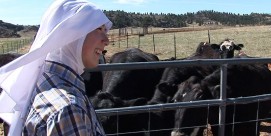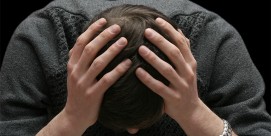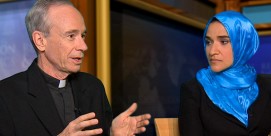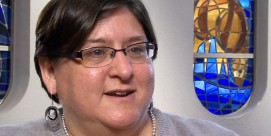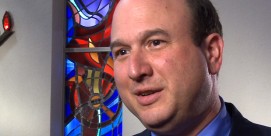New York State of Mind
BOB ABERNETHY, anchor: Even more than five weeks later, America remains deeply shaken by the events of September 11th — no more so than in New York, where, as one psychotherapist put it, “Everyone who lived through this is at some level operating as a trauma survivor.” We talked with three religious New Yorkers to see how they were affected. Our correspondent Betty Rollin reports.
BETTY ROLLIN: Helen Cha-Pyo, a United Methodist, is the associate music director at New York’s Riverside Church. These days she’s conducting an opera at the church with her usual vigor. Six weeks ago, she says, she could hardly get herself to move.
HELEN CHA-PYO: For the first time in a long time in my life, I felt like I couldn’t do anything, except for taking care of my son; everything was irrelevant.
ROLLIN: Helen feels her music has been a great source of comfort to her, as it has been to others.
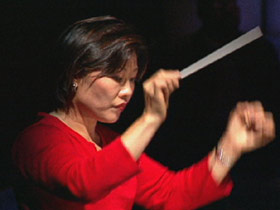
MS. CHA-PYO: It was also a way for me to connect to God; the way God created me, my given talent, what I do best is music.
ROLLIN: Some people who suffer feel closer to God; some, more distant. For Helen, September 11th forced her to ask how a Christian could love even a terrorist.
MS. CHA-PYO: For me, the center of Jesus’ teaching is about love; the one I struggle the most [with] and I want to live by every day is love your neighbor as yourself, love your enemies as yourself.
JOAN KAVANAUGH (on phone): I’m going to see you on Monday.
ROLLIN: Joan Kavanaugh is both a minister and a psychotherapist who does counseling at the Riverside Church.
MS. KAVANAUGH: When this first happened, there was a kind of natural numbing effect and a lot of people sat around in their own apartments hiding out for days and we’re really beginning to see a lot more people calling in now. Maybe they haven’t lost anybody or didn’t know anyone in particular, but they feel deeply identified with everything that has happened and they’re thrown.
ROLLIN: Have you run across anyone whose faith has been shaken by this?
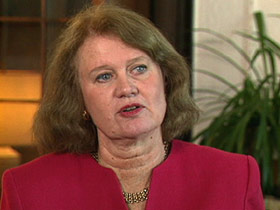
MS. KAVANAUGH: Absolutely. For anyone whose belief in God was based on a protective view of God, if you are a good person and you pray and you feel connected to God, do the right things, then that God will protect you. Then what does that imply? What kind of God was there for all the 5,000 who were killed that day? So people have to overcome their idea of God as the protector, who protects us in life, and move more to a level where they are understanding that we have a God who is with us in terrible things but who does not protect us.
ROLLIN: So what you are describing is a kind of religious maturity?
MS. KAVANAUGH: That it has to be a journey and a deepening maturity of your religious faith.
ROLLIN: Along with hundreds of other Jewish New Yorkers, Anne Mintz observed the month anniversary of September 11th at a special memorial service. Jews traditionally mark the one month anniversary of a death.
Coincidentally, one week after the attack, the Jewish high holidays began — for Anne, a well-timed source of comfort and community.
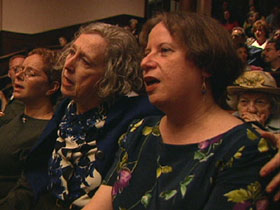
MS. MINTZ: There is a lot of liturgy that talks about the fragility of life and who shall live and who shall die, and it was right there and available to us in the synagogue.
It connected me to something that was much larger than me, that made me feel part of a community. I didn’t have to make a phone call to have all these people I knew be at the same place at the same time, to feel the way I was feeling.
ROLLIN: New York has the largest Muslim population in America. Muslim organizations were quick to condemn the terrorism, and Muslims here have been as traumatized as anyone else, but they’ve had the additional fear of being targeted by their fellow Americans.
Hence a constant police presence at this mosque.
MR. NAEEM BAIG: There was a guy who spat at my sister while she was stopped at the gas station and passed on racial slurs.
ROLLIN: Naeem Baig, a Muslim originally from Pakistan, is mourning those who died and worrying for his religion.
MR. BAIG: I felt whatever we gained in the last 10 years in America, the Muslim community, we lost on that day.
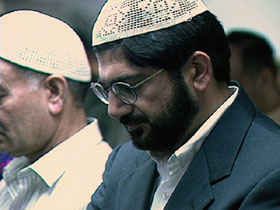
ROLLIN: Naeem’s own faith in Allah is unshaken.
MR. BAIG: Everything and anything which happens in the world cannot happen without the permission of the Almighty God.
ROLLIN: But Naeem is aware of the obvious question: How could Allah have allowed this to happen?
MR. BAIG: How can Almighty God, merciful, let that happen to innocent people?
ROLLIN: What is the answer?
MR. BAIG: The answer is that through these tragedies, Almighty God is giving us lessons, is judging us, how we are going to behave.
ROLLIN: Has any good come from these horrific events? Joan Kavanaugh thinks so.
MS. KAVANAUGH: When you come up against death, you also come up against the preciousness of life, and one of the most meaningful things for me is the injunction in the Book of Deuteronomy where God says, “Place before you life and death — therefore, choose life.” And that’s what we all have to figure out how to do.
For RELIGION & ETHICS NEWSWEEKLY, this is Betty Rollin in New York.
Credits:
Zamir Chorale, directed by Matthew Lazar
Debbie Friedman, who sang the Jewish healing prayer “Mi She-Berach”

